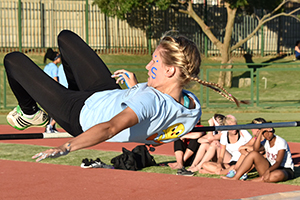
It was a day filled with excitement on and off the
track when the residences at the University of
the Free State competed against each other
during the first-year athletics event.
Photo: Charl Devenish
The University of the Free State’s first-year athletics is an institution. It is a day marked by colour, spirit, and hoarse voices, but in 2017 produced something different than the last couple of years.
For the first time in four years, new athletics champions were crowned in both the men’s and women’s sections when Veritas and Sonnedou walked away with the trophies at Pellies Park on the Bloemfontein Campus on 25 January 2017.
Wag-’n-Bietjie, Vishuis relinquish titles
Sonnedou, who came second in 2016, broke Wag-’n-Bietjie’s stronghold of the past six years by winning the women’s athletics trophy. Furthermore, Sonnedou won this trophy more than a decade ago – in 2004. Veritas, who won the men’s athletics trophy for the first time since 2011, also put a stop to Vishuis’s dominance. House Abraham Fischer has worn the athletics crown for the past three years.
This year, Vishuis (70 points) took second place after Veritas (76), with Armentum (61) third. Sonnedou (99 points) easily triumphed in the women’s division, while Akasia (36) and Wag-?-Bietjie (34) respectively took second and third place.
Veritas captures overall Spirit trophy
However, the event is about much more than the action on and around the athletics track. First-years also get the opportunity to show pride in their residences by shouting at the top of their lungs.
Veritas, better-known in recent years for its excellent sêr groups, asserted itself even more by being named as the overall winner of the Spirit trophy. This residence was also the winner of the men’s section. Harmony won the Spirit trophy for women’s residences, while Conlaurês was the co-ed residence with the greatest spirit.